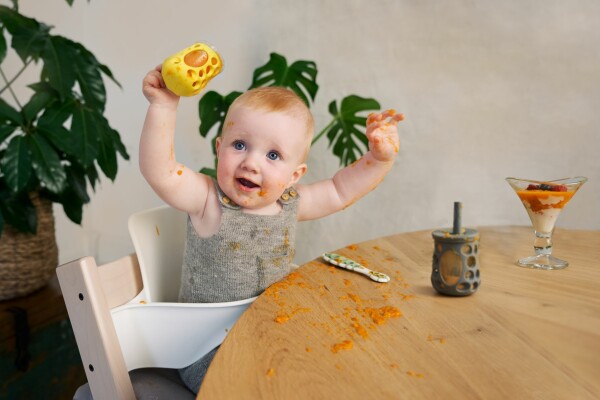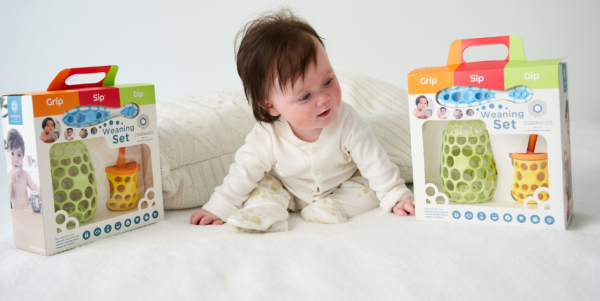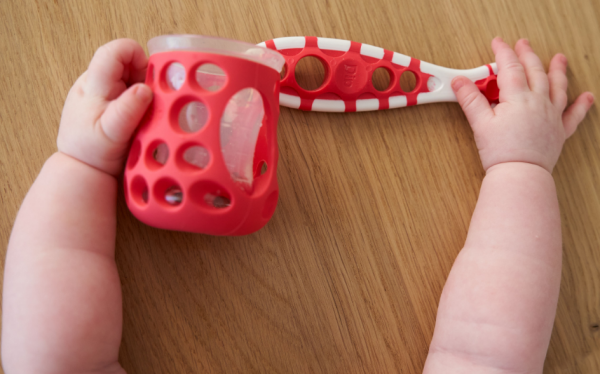
Top tips on the benefits of open cups for a baby’s development.
Every major and minor milestone a baby reaches in their first 1,000 days of life, signifies an even more significant stage of their brain development. As parents we eagerly tracked our baby's growth and development in utero, comparing their size to objects we could all understand, from a tiny poppy seed to a giant watermelon. We read up on their brain and organ development, lapping up all of this knowledge until we meet our little human.
Once they are born, we are aware of our child progressing from making eye contact to their first smile and onwards through the developmental stages of rolling over to crawling. The gross motor skills are easy to spot, but as we become overwhelmed with all of the responsibilities of being a parent, we tend not to find the time to read up on all of the smaller leaps our babies make when it comes to their brain development.

As a neurodevelopment child expert, I am passionate about giving parents the supports to help their children be the best version of themselves. Through my work with children, I developed a range of products to encourage key stages of brain development, physical strength and motor skills with my brand Cognikids. The weaning stage for example is not only about food, it is also full of opportunities to develop finer motor skills and aid the development of muscles in the jaw and mouth for speech. There are lots of things that parents can do to encourage the brain to meet these key developmental needs and progress from their primitive instincts. Focusing on the weaning stage my Dip spoon helps to develop grip and self-feeding with celebrity fans like Joe Wicks enjoying its benefits with daughter Indie and more recently his son Marley.
One of these core skills, which is often overlooked, is developing the ability to sip, the natural next stage from your baby's primitive instinct to suck. This is why medical experts, dentists and our own government health department, the HSE, recommend that babies from six months begin to drink from an open cup. Naturally, many parents prefer to use a sippy cup with a hard spout instead as there is less chance to spill the contents. However, this kind of drinking cup can inhibit jaw and tongue development, vital for speech. It can also impact on palate formation and allow the liquid to pool at the front of baby's mouth affecting dental health.

The Cognikids open cup, Sip, is an intuitively designed baby cup with an outer grip that helps babies as young as six months, learn how to sip, progressing from the suck action they are born with. The outer grip helps babies to develop their fine motor skills and makes it easier for them to pick up the cup even if their hands are wet or slimy from exploring their food. The diameter of the Sip cup is small so that babies can make a good seal and learn to develop the sip action. This sip movement moves the liquid to back of the mouth compared to a suck from a spouted sippy cup where the liquid can pool at the front of the mouth and impact the health of baby teeth. As your baby practices this sip action their correct jaw alignment and tongue will become stronger and they will start to move independently of each other. This is a sign of their maturing facial development. Learning to sip rather than suck, also paves the way for healthy palette formation and teeth development.

Understandably the Sip open top drinking cup may present some challenges for little ones on the move, so with that in mind, we have developed a handy accessory pack for our Sip cup, with a clever lid and carefully positioned silicone straw for little ones on the move. Not only this, as with all our products there is a huge developmental benefit too. Straw drinking allows for healthy oral development and makes sure that the lips, palette, tongue and jaw are in the correct position for drinking. It also helps to develop tongue stabilisation at the back of the mouth which is important for connected speech & speech clarity development. Then all other required tongue movements can occur from this place of stabilisation. Straw drinking requires complex movement from the jaw, lips and tongue. Through the coordination of these movements a vacuum draw is created. Each of our speech sounds are made with a different combination of these graded movements. It is also very important for the future oral motor development of babies and toddlers.
